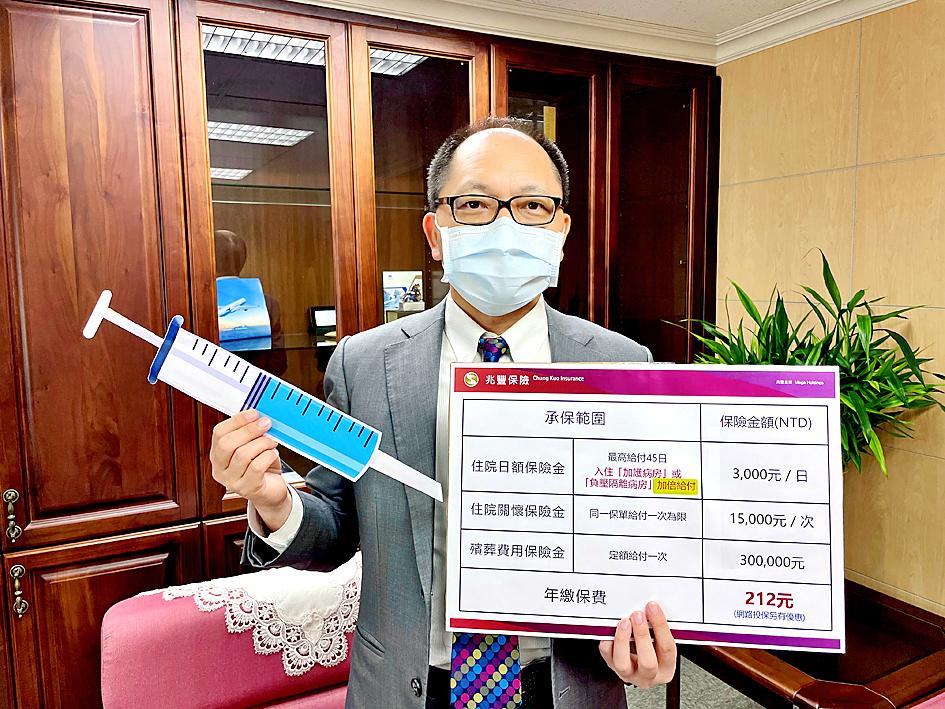A total of 465,689 insurance policies were sold online in Taiwan in the first quarter, down 25 percent from a year earlier, as demand for international travel insurance and interest-sensitive annuities fell due to border controls and falling returns respectively, Financial Supervisory Commission (FSC) data showed.
Property insurers sold 437,772 policies online, down 20 percent from a year earlier, while life insurers reported 61 percent less in sold policies at 27,917, the data showed.
Life insurer’s interest-sensitive annuities took a hit from reduced declared interest rates, which decide the monthly bonus that policyholders could earn, the commission said in a statement.

Photo courtesy of Chung Kuo Insurance Co
A total of 821 interest-sensitive annuities were sold during the January-to-March period, with first-year premiums of NT$145 million (US$5.23 million), both halved from a year earlier, the data showed.
Travel insurance products also lost momentum due to ongoing border controls amid the COVID-19 pandemic, with 13,136 policies sold last quarter, down 44 percent from a year earlier. Their first-year premiums were NT$3.29 million, also down 68 percent year-on-year, the data showed.
Customers still purchased travel insurance for their domestic trips, but sales were lower due to cheaper insurance charges, the commission said.
As a result, life insurers saw their combined first-year premiums fall by 46 percent year-on-year to NT$158 million in the first three months, the data showed.
On the other hand, property insurers’ first-year premiums rose 19 percent annually to NT$466 million, as their losses from travel insurance sales were offset by double-digit percentage growth in sales of scooter insurance, the data showed.
About 215,000 scooter insurance policies were sold, with premiums totaling NT$183 million in the first quarter, nearly double that of a year earlier, as more scooter owners preferred buying the compulsory insurance and additional coverage online for discounts, the commission said.
Overall first-year premiums of all online insurance policies declined 9 percent to NT$624 million in the first three months, it said.
Online sales of insurance might pick up this quarter, as insurance companies began selling virus and medical insurance against COVID-19 online from this month, which could attract customers, the commission said.

South Korea’s equity benchmark yesterday crossed a new milestone just a month after surpassing the once-unthinkable 5,000 mark as surging global memory demand powers the country’s biggest chipmakers. The KOSPI advanced as much as 2.6 percent to a record 6,123, with Samsung Electronics Co and SK Hynix Inc each gaining more than 2 percent. With the benchmark now up 45 percent this year, South Korea’s stock market capitalization has also moved past France’s, following last month’s overtaking of Germany’s. Long overlooked by foreign funds, despite being undervalued, South Korean stocks have now emerged as clear winners in the global market. The so-called “artificial intelligence

CONFUSION: Taiwan, Japan and other big exporters are cautiously monitoring the situation, while analysts said more Trump responses ate likely after his loss in court US trading partners in Asia started weighing fresh uncertainties yesterday after President Donald Trump vowed to impose a new tariff on imports, hours after the Supreme Court struck down many of the sweeping levies he used to launch a global trade war. The court’s ruling invalidated a number of tariffs that the Trump administration had imposed on Asian export powerhouses from China and South Korea to Japan and Taiwan, the world’s largest chip maker and a key player in tech supply chains. Within hours, Trump said he would impose a new 10 percent duty on US imports from all countries starting on

Chinese artificial intelligence (AI) start-up DeepSeek’s (深度求索) latest AI model, set to be released as soon as next week, was trained on Nvidia Corp’s most advanced AI chip, the Blackwell, a senior official of US President Donald Trump’s administration said on Monday, in what could represent a violation of US export controls. The US believes DeepSeek will remove the technical indicators that might reveal its use of American AI chips, the official said, adding that the Blackwells are likely clustered at its data center in Inner Mongolia, an autonomous region of China. The person declined to say how the US government received

Like many of us who are mindful of our plastic consumption, Beth Gardiner would take her own bags to the supermarket and be annoyed whenever she forgot to do so. Out without her refillable bottle, she would avoid buying bottled water. “Here I am, in my own little life, worrying about that and trying to use less plastic,” she says. Then she read an article in this newspaper, just over eight years ago, and discovered that fossil fuel companies had plowed more than US$180 billion into plastic plants in the US since 2010. “It was a kick in the teeth,” Gardiner